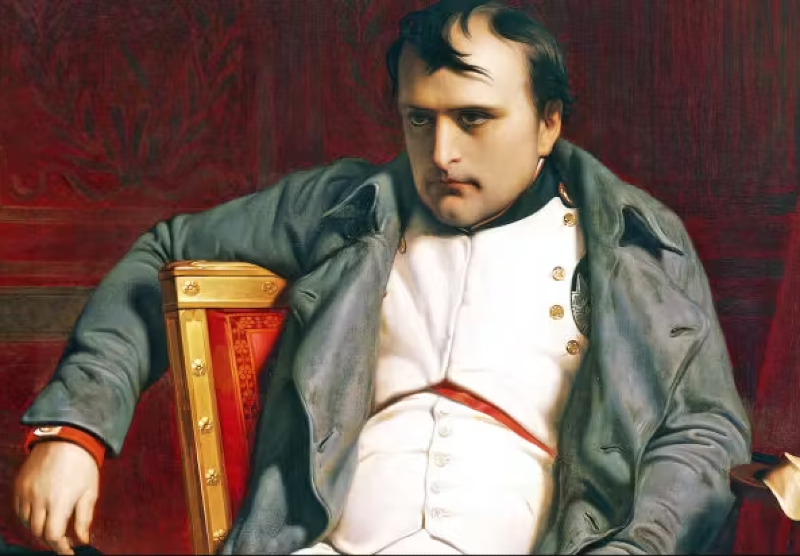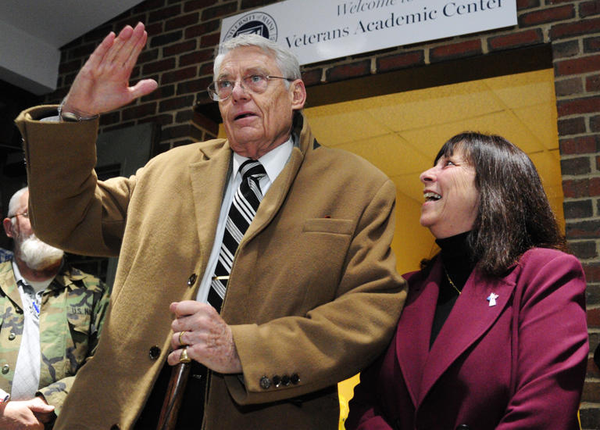Racecar driver lost both his legs and became an Olympic athlete

From Wikipedia: "Alessandro Zanardi is an Italian former professional racing driver who won the CART championship in 1997 and 1998, and took 15 wins in the series. He also raced in Formula One from 1991 to 1994 and again in 1999; his best result was a sixth-place finish in the 1993 Brazilian Grand Prix. He returned to CART in 2001, but a major crash in the 2001 American Memorial resulted in the amputation of his legs. He returned to racing less than two years after the accident, competing in the European Touring Car Championship in 2003–2004 and then in the World Touring Car Championship between 2005 and 2009; he scored four wins. In addition to continuing to race cars, Zanardi took up competition in handcycling, a form of paralympic cycling. In September 2012 he won gold medals at the London Paralympics and in September 2016 he won a gold and a silver medal at the 2016 Rio de Janeiro Paralympics."
While in exile on Elba Island the former emperor Napoleon decided to take English lessons

From Public Domain Review: "Napoleon had had a rollercoaster eighteen months. First he had been forced to abdicate as Emperor of France and exiled to the island of Elba. Then he had managed to escape, march on Paris, and retake the throne. Finally a crushing loss at Waterloo had led to exile once again, this time to a far more remote island called Saint Helena. The watery walls of his new South Atlantic prison were at least a thousand miles thick in every direction. The British had agreed to provide Le Petit Caporal with plentiful wine, meat, and musical instruments, but he could not have what he most craved — family, power, Europe. To make matters worse, he had virtually nothing to read. Newspapers were banned, and those he did manage to get his hands on were nearly all in English. That was the main reason why, on January 16, 1816, three months after landing on the island, he decided to learn the language of his captors."
How the dingo first arrived in Australia and eventually took over the Outback

From Noema: "In Australia, there is a display of human ingenuity that is almost equal to the Great Wall of China. The Great Wall never fully walled China, but the enormous Dingo Fence guards a full quarter of a continent, running nearly from coast to coast, unbroken through some of the most inhospitable landscapes in the world. Warding off the Australian southeast, this fence begins between the towns of Jandowae and Jimbour in southern Queensland and runs for a total of almost 3,500 miles before it ends off the Eyre Peninsula. The longest fence in the world was built and is maintained for a single purpose: to protect Australia’s pastoral heartlands from the dingo, the southern continent’s infamous wild dog. A reddish, medium-sized canine with short, smooth fur and a powerful bite, it is the largest predator in the Australian Outback and the only one dangerous to livestock. On rare occasions, they have even been known to attack humans."
Hi everyone! Mathew Ingram here. I am able to continue writing this newsletter in part because of your financial help and support, which you can do either through my Patreon or by upgrading your subscription to a monthly contribution. I enjoy gathering all of these links and sharing them with you, but it does take time, and your support makes it possible for me to do that. I also write a weekly newsletter of technology analysis called The Torment Nexus.
The extraordinary reason why scientists are collecting sea turtle tears

From Vox: "Each year, in late spring and early summer, female sea turtles will crawl out of the ocean under moonlight to lay their eggs in the sand, often returning to the same beach on which they were born many years earlier. Sometimes when the turtles emerge to nest, researchers like Julianna Martin are watching patiently from the shadows. For her doctoral research, Martin has been analyzing sea turtle tears. So on several summer nights in 2023 and 2024, she’d stake out beaches and wait for the turtles to start laying eggs. At that point, the reptiles enter a sort of “trance,” she said, allowing scientists like her to collect samples, including tears. This odd work serves a purpose. Martin is examining sea turtle tears to see if they contain a specific kind of bacteria. Such a discovery, she said, could help unlock one of biology’s biggest and most awe-inspiring mysteries: how animals navigate using Earth’s invisible magnetic field."
Archaeologists discover that vanilla was used in Europe much earlier than previously thought

From La Brujula Verde: "A recent archaeobotanical study has uncovered an unexpected discovery in the heart of Europe: the oldest evidence of vanilla use on the continent. It is a dried vanilla pod, found in a waste vault in the Vladislav Hall of Prague Castle, dated between 1513 and 1666. This discovery offers new clues about the introduction and trade of this coveted product, traditionally associated with Mesoamerica, in the Old World. The vanilla pod was found in a waste deposit within Prague Castle, one of the city’s most iconic structures, which served as an imperial residence in the 16th century. Its radiocarbon dating revealed that the sample belongs to a period spanning from the early 16th century to the late 17th century, coinciding with the reign of Rudolf II, a monarch known for his interest in science and alchemy."
Mars rover gets a 360-degree view of the surface of the red planet
A 360° view from the surface of Mars from Perseverance Rover.
— Wonder of Science (@wonderofscience) April 3, 2025
📸: NASA/JPL-Caltech/Simeon Schmauß pic.twitter.com/zpuC6MWmPb
Acknowledgements: I find a lot of these links myself, but I also get some from other newsletters that I rely on as "serendipity engines," such as The Morning News from Rosecrans Baldwin and Andrew Womack, Jodi Ettenberg's Curious About Everything, Dan Lewis's Now I Know, Robert Cottrell and Caroline Crampton's The Browser, Clive Thompson's Linkfest, Noah Brier and Colin Nagy's Why Is This Interesting, Maria Popova's The Marginalian, Sheehan Quirke AKA The Cultural Tutor, the Smithsonian magazine, and JSTOR Daily. If you come across something interesting that you think should be included here, please feel free to email me at mathew @ mathewingram dot com



